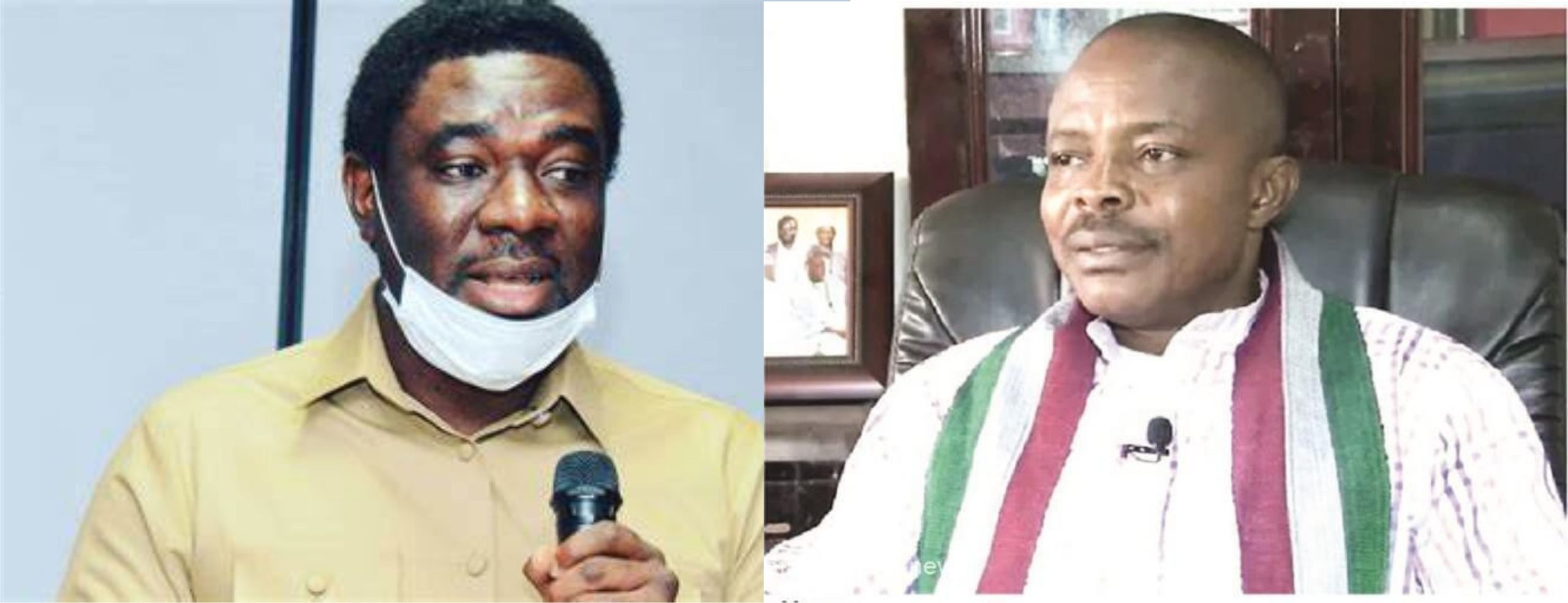Nigeria’s move to introduce a cybersecurity levy by the Central Bank has sparked widespread opposition from various quarters, including Nigerian Labour Unions and bank customers. The levy, aimed at enhancing cybersecurity measures, has been met with criticism for potentially worsening economic hardship.
The Nigeria Labour Congress (NLC), Trade Union Congress (TUC), and bank customers have voiced their concerns, emphasizing the negative impact of the levy on ordinary Nigerians already grappling with economic challenges.
Join our WhatsApp ChannelNLC President, Joe Ajaero, denounced the levy as “another burden on the shoulders of hardworking Nigerians,” expressing the union’s condemnation of the government’s decision. He highlighted the strain it would place on the populace amidst existing financial difficulties.
“This levy, to be implemented by deduction at the transaction origination, is yet another burden on the shoulders of hardworking Nigerians. This move, ostensibly aimed at bolstering cybersecurity measures, threatens to exacerbate the financial strain already faced by the populace.”
Similarly, TUC’s National Vice President, Tommy Etim, criticized the government’s unilateral approach, labeling the levy as discouraging to banking and detrimental to economic growth. He called for broader stakeholder engagement and urged the government to refrain from implementing anti-people policies.
Tommy Etim, said, “It is highly unfortunate. It is also another way to discourage people from banking. If people are discouraged from banking because of deductions such as cybersecurity levies, and admin charges, it means that the informal economy, manufacturing economy, and entrepreneurs will suffer.
“It’s unfortunate that the government will carry out such a sensitive issue without stakeholder engagement. Nigeria is too big to be taken for granted. The time has come for them to know that democracy involves the people. The National Assembly should not allow this to happen otherwise it will be discouragement in terms of banking transactions. Nigeria’s problems cannot be solved overnight.”
READ ALSO: CBN Orders Banks To Charge 0.5% Cybersecurity Levy On Transactions
Dr. Uju Ogubunka, President of the Bank Customers Association of Nigeria, echoed these sentiments, expressing concerns over the levy’s adverse effects on cashless initiatives and financial inclusion drives.
He said, “I do not call it charge; I call it tax. It is another form of government tax. It can never be a welcome one because they did not give us any reason; there is no justification.
“If you want to do such a thing, you must provide your reason or justification. What about those who do not have accounts in the bank for instance? So, how do you get their portions? For me as an individual, I think it is unfair and that the government did not come with clean hands. I cannot remember anybody being consulted before this kind of policy.
“What they are trying to do is to set us backwards. We are talking about less cash in this economy and now you want to be charging customers for making transfers. If you do not want to be charged then you carry your cash. How are we helping this other policy, if we go this way? I think they need to rethink it and have wider consultations.”
The Central Bank’s directive, issued via circular, mandates financial institutions to commence the levy within two weeks, citing the need for compliance with cybersecurity laws and the National Cybersecurity Fund. However, exemptions are provided for specific transactions to prevent undue financial strain on customers.
Despite the rationale behind the levy, criticisms have intensified, with various stakeholders questioning its necessity and potential repercussions. The Nigerian Association of Chambers of Commerce, Industry, Mines, and Agriculture called it a “stealth tax” on the private sector, emphasizing the need for a thorough review.
Dele Kelvin Oye, NACCIMA National President, emphasized the importance of transparency in fund allocation and management, urging the involvement of the private sector in oversight to ensure accountability.
He said, “We are still in consultation with our stakeholders. However, we feel compelled to comment on the implementation of this cybersecurity levy as outlined in a circular signed by the respective Directors of the CBN Payments System Management Department and the Financial Policy and Regulation Department of the CBN.
“While NACCIMA recognises the importance of bolstering our national cybersecurity infrastructure, the blanket imposition of this levy without a limit raises significant issues that warrant a thorough review and reconsideration by the authorities.
“Firstly, the security and defence sectors are already substantial recipients of the national budget. They are responsible for tackling a hybrid of security challenges like terrorism, banditry and other internal conflicts in Nigeria. However, cybersecurity is firstly a transnational issue, which requires cooperation between international security agencies and requires highly skilled and experienced human resources. For this reason, we believe the burden should be shared across the current security and defence budget.”
Financial economist, Prof. Uche Uwaleke, cautioned against the levy’s adverse effects on monetary policy transmission and financial intermediation. He called for its suspension pending comprehensive fiscal policy reforms.
Socio-Economic Rights and Accountability Project (SERAP) issued a stern warning, threatening legal action if the government fails to reverse the levy within 48 hours. They argued that the levy constitutes an unlawful imposition on Nigerians.
While the government aims to enhance cybersecurity and boost revenue, experts like Olugbenga Odeyemi and Dr. Vincent Nwani caution against unintended consequences, including increased consumer prices and economic burdens.
As opposition mounts against the cybersecurity levy, the government faces pressure to reconsider its implementation strategy and engage stakeholders for a more inclusive approach. The debate underscores the delicate balance between security imperatives and socio-economic considerations in policy formulation.
Echoing the resistance to the cybersecurity levy on Tuesday, a financial economist and Professor of Capital Market at the Nasarawa State University Keffi, Uche Uwaleke, described it as ill-timed, with a chance of lessening the impact of monetary policy transmission.
He said, “I think the cybersecurity levy is ill-timed, coming at a time when the CBN is concerned about the increasing rate of currency circulating outside the banks. It carries the downside risk of discouraging financial intermediation as well as complicating the transmission of monetary policy, with more people shunning the banks due to high charges.
“The result is that it makes it a difficult effort by the CBN to tame inflation.”
He, therefore, called for the suspension of the policy, saying, “The circular should be withdrawn, especially against the backdrop of assurances by the government that its plan to increase revenue would not include introducing new taxes or increasing tax rates.
An economist based in Lagos, Daniel Emeka, in his submission, said, “The cybersecurity levy stands as an additional stream of income for the government more so that collection of the revenue comes at little or no cost. At a total of N600tn NIP transfers in 2023, if half of such transactions are eligible for the cybersecurity levy, the government will generate about N1.5trn.
“Nigeria loses $500m annually to cybercrime and this levy will potentially provide a dedicated source of funding for cybersecurity efforts. A strong cybersecurity framework enhances investor confidence because it boosts investors’ confidence in the security of their digital transactions.”
Emeka highlighted that businesses were increasingly scaling down, cutting back employment, and adapting all sorts of lean measures in a bid to navigate an extraordinarily challenging business environment.
“Customers and the public on the other hand are struggling with high cost of living, declining real wages, and lower consumption exacerbated by recent reforms such as removal of full subsidy, floating of the FX, increase of electricity tariff, increase of lending rate, etc. The new cybersecurity levy serves as another wave of financial burden on businesses and the public with attendant implications such as undermining financial inclusion drive and discouraging e-transactions.
“The timeline set for implementation of the new cybersecurity charge should be revisited because it coincides with a period when the public and economic agents have so much on their plate to deal with.”
Amidst the ongoing discourse, Nigeria’s digital financial landscape continues to evolve, highlighting the need for nuanced approaches to regulatory frameworks and fiscal policies to foster inclusive growth and financial stability.
Emmanuel Ochayi is a journalist. He is a graduate of the University of Lagos, School of first choice and the nations pride. Emmanuel is keen on exploring writing angles in different areas, including Business, climate change, politics, Education, and others.




















Follow Us